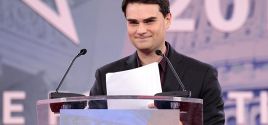Patently ImproperObama's "reform": from bad to worseby Wendy McElroy, The Freeman Sep. 28, 2011 |
Popular 
'More Winning!' Ben Shapiro Celebrates Trump Assembling an Israel First Cabinet

Report: Trump Picks Kristi Noem to Head DHS

Trump Picks Jewish Real Estate Investor Steve Witkoff for Middle East Envoy

Trump Picks Matt Gaetz for Attorney General

Trump Picks Fox News Host Pete Hegseth for Secretary of Defense
 If knowledge is power, then ownership of knowledge and its application is an ultimate grasp on power. President Obama made the overhaul of America's patent law a personal priority, including it prominently in his January 2011 State of the Union address. The America Invents Act was signed into law on September 16. The key change is a switch from "first to invent" to "first to file." Critics and advocates overwhelmingly focus on the practical implications of the Act. Fundamental questions about patents are rarely raised. These questions include: What is a patent? Do patents express a natural right or a governmental grant of monopoly? What Is a Patent? Patents and copyrights protect what is called "intellectual property." A patent is an ownership claim to the expression or implementation of an idea. If the idea is an original expression -- for example, music -- the ownership claim is called copyright. If it is expression through implementation -- for example, an improvement to a machine — the claim is called a patent. The holder of a patent can prevent anyone else from identically implementing the same idea. At its root, controversy over intellectual property is about freedom of expression and when it can be properly restricted. Patents and copyright quickly part company. The most famous libertarian to make a sharp distinction between the two was the single-tax champion Henry George. He rejected the former and embraced the latter. Why? In his periodical The Standard (June 23, 1888), George explained his objection to patents, "No man can justly claim ownership in natural laws, nor in any of the potentialities which nature hold for it." A patent involves identifying and using a law of nature or a fact of reality, neither of which have been created by the discoverer. Discovery versus Production? George distinguished between two forms of labor involved in invention. The first was the mental labor of working out operating principles: discovery. The second form was the construction of a specific machine or implementation: production. Since the principles discovered were preexisting -- such as how X amps of electricity react to Y ohms of resistance — they should be available for anyone to use and not monopolized by one man. To the argument that specific implementations -- such as voltmeters — did not exist in nature and so could be patented, George replied that the principles on which machines operated were intrinsic in nature. A windmill expresses how the force of wind pushing against a particular surface can produce power. Thus every patent amounts to an ownership claim over an expression of nature and the logic of its application. A man could own a specific windmill he produced but he could not prevent others from similarly producing their own windmills. This is a common distinction between patents and copyright. Patents are an ownership claim over preexisting natural laws and their implementation; copyright is a claim to "goods" with no preexistence. Simultaneous Discovery Another argument against patents is that they violate the rights of a simultaneous inventor. Two people can plausibly invent the same thing independently and at nearly the same moment; hence it is not proper for only one to have a monopoly. Fields of endeavor can reach a stage where certain breakthroughs become almost inevitable. Then it is not uncommon for people independently to develop extremely similar applications. The most famous example may be calculus, developed by both Newton and Leibniz. This objection to patents was expressed by the nineteenth-century libertarian Benjamin Tucker: "The central injustice of . . . patent laws is that it [sic] compels the race to pay an individual through a long term of years a monopoly price for knowledge that he has discovered today although some other man . . . in many cases very probably would have discovered it tomorrow." Obama's patent "reform" trades one injustice for another. Formerly the first to invent won the patent, even if someone else indisputably did the same thing independently. Now the first to file for a patent will win, similarly excluding independent inventors -- not to mention anyone else who tries to use the natural principles as embodied in the invention. Roots of Patent Historically patents were grants of privilege awarded by a ruler to his favorites or to those willing to pay bribes. America broke precedent. Article I, Section 8 of the Constitution states, "Congress shall have the power . . . to promote the progress of science and useful arts, by securing for limited times to authors and inventors the exclusive right to their respective writings and discoveries." The original American patent law thus extended protection in order to encourage innovation. However, one might say that it simply changed the criterion by which monopoly privilege would be granted. Whether you agree with that original purpose or believe (as I do) that all patents are improper, the America Invents Act is repellent. By granting patents to those who merely file first rather than invent first, Obama further advantages State-privileged corporations with their massive research funds and lawyers, and takes a huge step backward toward the days of patents as royal privileges. __ Wendy McElroy is the author of The Reasonable Woman: A Guide to Intellectual Survival (Prometheus Books, 1998). She actively manages two websites: http://www.ifeminists.com and http://www.wendymcelroy.com. See her article archives. |



